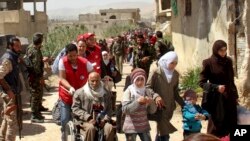U.N. agencies report an alarming escalation of humanitarian needs in war-torn Syria as violence, displacement and the suffering of the Syrian people reach new heights.
While people throughout Syria are in desperate need of humanitarian assistance and protection, U.N. agencies say they are particularly concerned about tens of thousands of civilians trapped in Douma, a town inside eastern Ghouta in the suburbs of Damascus.
Dozens of people reportedly were killed during an alleged chemical attack Saturday in Douma. Spokesman for the Office for the Coordination of Humanitarian Affairs, Jens Laerke, says the United Nations has no access to eastern Ghouta, which is still under siege. He says the U.N. can neither confirm nor deny a chemical attack occurred.
“We are in a place outside of eastern Ghouta in those eight centers where we can provide some aid. We are not in eastern Ghouta. And for these, I should say extremely serious allegations with very severe ramifications - political, military and otherwise, we need to be absolutely sure that what we say is correct,” Laerke said.
The U.N. refugee agency reports more than 133,000 people have fled eastern Ghouta during the past four weeks. Spokesman Andre Mahecic says the UNHCR is working with U.N. and private agencies to help improve the sub-standard conditions at these collective shelters. He says the displaced are in great need of everything, as they have fled their homes with nothing.
“It is particularly difficult for women and children. As you can imagine. If you have only the clothes you wear, you have nowhere to wash them, you have nowhere to change, you have no way of keeping your personal hygiene. And this only adds to all of the risks that these people have been already exposed to and are currently exposed to in the congested shelters,” Mahecic said.
The UNHCR estimates 44,000 people - mainly women, children and the elderly - have completed their security screening and have been allowed to leave the collective shelters. The agency says no constraints should be put on the freedom of movement of civilians. It says they should be free to choose where they wish to go once they leave the centers.




